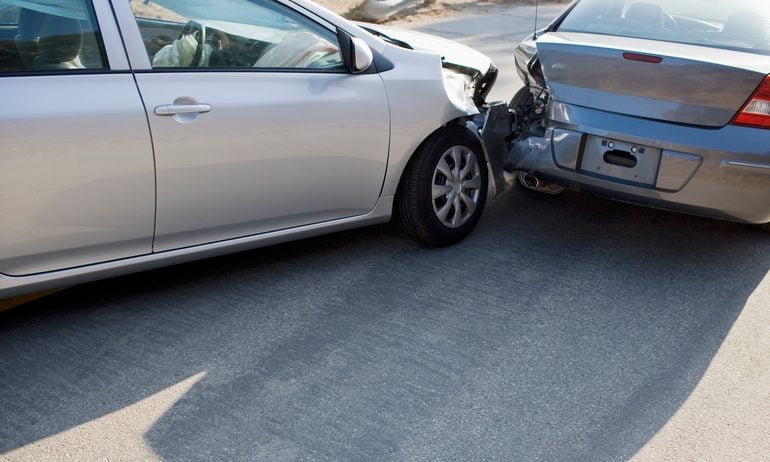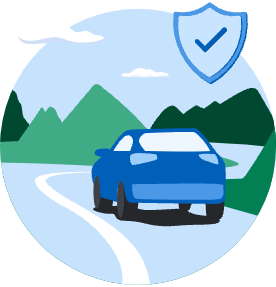How to File a Car Insurance Claim
As part of the car insurance claim process, you may need to submit a police report and evidence of damage to your insurer.

Many, or all, of the products featured on this page are from our advertising partners who compensate us when you take certain actions on our website or click to take an action on their website. However, this does not influence our evaluations. Our opinions are our own. Here is a list of our partners and here's how we make money.
Auto insurance is the kind of thing you buy and hope you never have to use. But if an accident does happen, or if a storm damages your vehicle, you’ll need to know how to file a car insurance claim. The path between the moment an accident happens and an insurance payout can seem murky, but it all comes down to five steps:
Call the police if you were in an accident or your car was vandalized or stolen.
Collect evidence and documentation of the incident.
Get in touch with your insurer.
Speak with an insurance adjuster.
Receive your insurance payout.
We’ll get into the specifics of each of these steps, but first …

See what you could save on car insurance
Easily compare personalized rates to see how much switching car insurance could save you.What is an auto insurance claim?
An auto insurance claim is a formal request you can submit to an insurer after you’ve been in a car accident or your car has been damaged. Filing a claim lets your insurer know you were in a wreck and want to take advantage of your benefits.
How do I file a car insurance claim?
1. Call the police
If you’re in a car accident, the first thing you must do is call the police. Even if nobody requires urgent medical attention and your state doesn’t require you to contact the police after a fender bender, you’ll need to file a police report to submit an auto insurance claim, and it’s best to get that handled before the details have faded.
Some states allow you to submit a police report on a car accident a few days after it occurs, but calling the police from the scene can speed up your auto insurance claim process. Safety should always be your top priority, so make sure you are out of harm’s way before picking up the phone.
If you plan to file a claim after an incident other than a collision, say if your car was damaged in a natural disaster or you hit a deer, you may not need to file a police report. But if your car was stolen or vandalized, contacting the police should be your first step.
2. Collect evidence and documentation of the incident
Get ready to file your car insurance claim by gathering information about the incident so you can answer your insurer’s questions.
While you’re at the scene, document what happened.
If you were in a car accident:
Take photos of your car and any others involved in the accident, making sure to capture all visible damage and the cars’ license plates.
Take photos of any damaged property and the wider scene of the accident.
Take down the names, phone numbers, addresses and insurance information of everyone involved in the wreck.
If you can, write a brief summary of the accident.
If the police arrived at the scene, make sure you get a copy of the police report.
If possible, take down the contact information of any witnesses to the accident. Their perspective might help your insurer address your claim.
When documenting a car accident, be as thorough as you can. Even if you have an amazing memory, details can get twisted or lost over time, and your documentation will come in handy once you’re speaking with a representative from your insurance company.
If your car was damaged in some other event:
Take photos of your car and the object or event that damaged it. For example, if a tree branch wrecked your car, make sure you take a picture before and after removing the branch.
If you did call the police, ask for a copy of the police report.
If possible, take down the contact information of any witnesses to the incident. Their perspective might help your insurer address your claim.
3. Get in touch with your insurer
Before you reach out to your insurer, it’s important to know when to file an auto insurance claim.
You will want to file an insurance claim if:
You were in an accident involving anybody else.
Your car was damaged in an accident where you were at fault, or in a non-collision incident, such as a tree falling on your car, and the cost to repair your car is more than your deductible.
If you've decided to file a claim, go to your insurer’s app or website, and choose how you’d like to report your claim. You can often file a claim online, but you can also call your insurer to have a representative guide you through the process. Your insurance company will probably ask for most of the information you collected in Step 2.
If you were in a car accident in which only your car was damaged, nobody else was involved and you have no collision coverage or the cost of the damage to your car doesn’t reach your collision deductible, you’re better off skipping the call to your insurer. Why? You won’t get a payout from your insurer, and the accident will stay on your record, which means you’ll likely see higher rates when you renew your policy.
Once you submit a claim, be prepared for an insurance adjuster to contact you within the next few days to go through the details of the incident. If you were in an accident where another driver was at fault, your insurer will likely contact theirs directly.
4. Speak with an insurance adjuster
An insurance adjuster investigates an insurance claim to figure out how much an insurer should pay for damage and injuries caused in an accident or other incident resulting in damage to your car. Think of them as a sort of auto insurance detective.
As part of their investigation, an adjuster will assess the damage reported on the claim, interview those involved in the incident, review your documentation and address personal injury claims. If anything is missing, they’ll let you know, but try to avoid extra back-and-forth by including everything you think they might need when you file your claim.
5. Receive your insurance payout
When the insurance adjuster determines the claim payout, if any, they’ll go over your options for receiving it.
You may receive a payout and arrange for your car to be repaired on your own or have the adjuster coordinate repairs and pay the repair shop chosen by your insurer directly. You are typically free to choose your own shop, but going with the insurer’s choice often has the benefit of a lifetime warranty.
If the insurance adjuster declares your vehicle a total loss under your collision or comprehensive coverage, you’ll receive a payment for the market value of the car minus your deductible. The same goes if your car was stolen.






